Relevant Overviews
- Bluesky and the ATmosphere
- Content Strategy
- Fediverse
- Online Strategy
- Online Community Management
- Social Media Strategy
- Content Creation & Marketing
- Online Architecture
- Digital Transformation
- Thinking tools
- Zettelkasten
- Blockchain, Crypto, NFTs etc
- Personal Productivity
- Innovation Strategy
- Surveillance Capitalism, Social media and Polarisation (Overview)
- Disinformation in the US 2020 elections
- Communications Tactics
- Psychology
- Social Web
- Media
- Politics
- Communications Strategy
- Science&Technology
- Business
Overview: Fediverse
What?
Strictly speaking, the Fediverse is a collection of interoperable social networks built on the open Web standard ActivityPub, including Twitter-lookalike Mastodon and YouTube-lookalike PeerTube, as well as Meta's Threads, which "federated" in 2024.
Unlike Twitter and YouTube, however:
- Mastodon/PeerTube are not owned and controlled by corporations. Anyone can launch and operate a Mastodon or PeerTube server, just like anyone can set up an email server and exchange emails with others using the email standard.
- The person who creates a server sets its rules (privacy, hate speech, etc).
- Users on any Mastodon/PeerTube server can not only interact with users on other Mastodon/PeerTube servers, they can interact across Fediverse platforms. For example:
- if Mastodon user A follows PeerTube user B, B’s PeerTube videos will appear in A’s Mastodon feed,
- user A can even comment on the video from within Mastodon, without visiting PeerTube or having a PeerTube account.
This would be like if my Twitter account followed someone's Facebook page, yet we could still interact seamlessly from our platform of preference. That’s impossible as Twitter & Facebook are walled gardens. Fediverse platforms like Mastodon and PeerTube are not – this is the Open Web on social.
So what?
While each Fediverse server is a community with its own rules, they're not walled gardens. This helps solve the vicious circle problem facing new platforms (why join a network where there are so few people on it? Hence noone joins it, so numbers stay low. So noone joins it): people don’t need to join the same social network, they just have to join any Fediverse network.
And that, in theory, changes everything. Instead of everyone being trapped in a few platforms owned by billionaires who impose the algorithm which maximises their profits (ie optimising for enragement), "The Fediverse thus promises a landscape of interconnected gardens of all shapes and sizes, each managed according to its inhabitant’s needs. People can roam everywhere, talk to anyone and change “home garden” at will" - Welcome to the Fediverse, starry-eyed noob.
Challenges
The ActivityPub approach, however, has some flaws - see:
- the singleton problem: it's "difficult to convince ... a major server to [federate] ... with a minor one... three Mastodon servers contain almost 60% of the known Mastodon population" - Peer-to-Peer Network Models and their Implications.
- "Federated networks become oligopolies at scale" due to forces seen everywhere ("airline routes, power grids, trains, banks, Bitcoin mining, protein interactions, ecological food webs, neural networks"), so the fediverse evolves to become something only a little better to the centralised apps it was trying to replace - see Nature's many attempts to evolve a Nostr
Other approaches to building alternative decentralised ecosystems therefore exist.
What about...?
Bluesky
By late 2024 I had opted for Bluesky as more promising for building decentralised collective intelligence, because:
- like Fedizens, Bluesky users own their data, but they can also move it wherever they like without changing their identity (unlike in the Fediverse).
- anyone can build on Bluesky, without asking permission, so any Bluesky user can subscribe to custom feeds and moderation tools developed by 3rd parties.
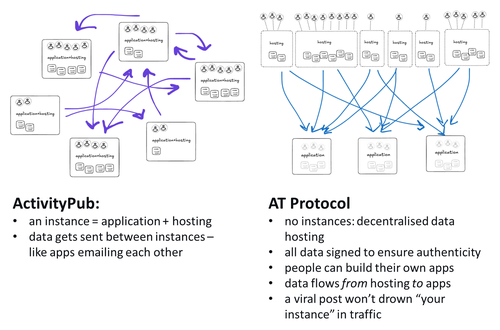
Derived from this Bluesky thread by @danabra.mov
Nostr & Farcaster
These both venture into blockchain territory. I'll be investigating these soon.
See also
- Tim Berners-Lee’s Solid, providing social media users with control over their data through personal knowledge graphs.
- adversarial interoperability - another part of the solution to this problem.
Personal state of play
ActivityPub
I was an early convert to ActivityPub as a theoretical idea, and in 2022 found myself writing a Fediverse strategy report for another EC department as the EU's Data Protection Supervisor and the EC's IT department launched social.network.europa.eu, the EU's own Mastodon server. The same year saw the EU Bubble's own server - https://eupolicy.social/ - launched. As I pointed out at the time, this had real potential: "it should be very easy for eupolicy.social to avoid creating a Brussels Bubble within the Fediverse... rather than building bridges outwards, we can pull national conversations into the Bubble, simply by following the right people." (Am I on the right Mastodon instance?).
At about the same time I took the plunge as part of the #TwitterMigration triggered by Elon Musk's purchase of Twitter. I was optimistic (my first post was literally Welcome to the Fediverse, starry-eyed noob), but within a few months I'd discovered an unhappy truth: the current infrastructure simply doesn't deliver content properly reliably.
I'd point you to the mid-2023 toot where I pointed this out, but (as if to illustrate my point) it's gone: in November my server simply disappeared, taking all my content and connections with it, without warning. I managed to dig out a screenshot of that toot from my phone and include it in All my toots gone.
Well before then the EU's experiments had become clearly underwhelming, with accounts limited to the institutions, rather than the people working in them. Someone clearly never read Euan Semple's "Organisations don't tweet, people do", missing a huge opportunity that news organisations started embracing in 2022: setting up a Fediverse server for their journalists to prove that they are their journalists, not an imposter. In April 2024 it was closed.
Meanwhile https://eupolicy.social/ was shrinking, from 720 active accounts soon after launch to 225 by late 2024.
From Threads to Bluesky...
Literally one month after my Mastodon server disappeared, Instagram's "Twitter-killer" Threads arrived in Europe, announcing their intention to join the Fediverse. I dug out my never-used Instagram account, and also launched a Bluesky account to kick both networks' tyres in parallel.
Currently I'm feeling confident about Bluesky, as set out in my November 2024 newsletter.
---
Version control
I develop this Fediverse Overview using the permanent versions pattern described in Two wiki authors and a blogger walk into a bar….
- changes in this version:
- updated to reflect what I learnt about Bluesky, and generally shortened
- version control
- this is version: 4
- previous versions available on my experimental wiki
---
More reading: resources tagged OR(#fediverse, #open web, #bluesky, #mastodon, #threads, #nostr) follow below:
Relevant resources
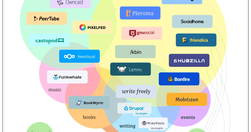
how "Mastodon fits into the much larger concept of the Fediverse... visualisation ... many different use-cases and benefits of different services".Good intro to the Fediverse as a whole, plus the visualisation in png & pdf, and some Q&As covering multiple accounts ("a user preference"), Nextcloud (adding ActivityPub end 2022). Wordpress & Drupal (…
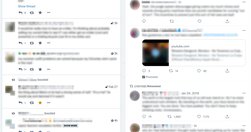
4 ways Mastodon doesn't optimise for enragement.On Mastodon’s "home timeline... posts don’t have metrics ... you have to click through ... makes you judge a post first by its content, rather than the score attached to it... the whole dynamic [being "ratioed"] doesn’t exist... leads to more thoughtful engagement rather than ... Liking every post by…

JJ "explore some of the opportunities afforded by the likes of Bluesky, Scuttlebutt, the Fediverse, and Indieweb — not to mention good, old, reliable RSS".Most of the mastodon tips I knew, except: "enable the advanced web interface (it’s like Tweetdeck)" - I didn't know that existed so moved to Tusky and spent my first week since twittermigration …
search the people you follow, are followed by, blocked & muted on Twitter, as well as the lists you maintain and follow, for possible Mastodon/Fediverse accounts. Provides graphs of which instances they're on, too, so useful for identifying which server to join.

I discovered the Fediverse as I kicked MyHub.ai’s shiny new tyres in early 2020, and I’m kicking myself now for not diving in then.
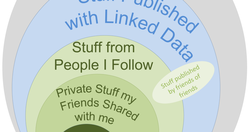
Writing a chapter for a book on Personal Knowledge Graphs made me rethink MyHub.ai, and led to a new collective intelligence pilot project with the founders of massive.wiki.
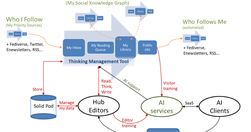
I've been invited to write a chapter for an upcoming book on Personal Knowledge Graphs (PKG). My chapter will encompass each user’s PKG, the Social Knowledge Graph created by networking them together via the Fediverse, Solid hosting, AI writing tools and Decentralised Autonomous Organisations.This post provides a first draft of its Introduction, i…

An overview of three protocols - ActivityPub, Scuttlebutt and Dat - and their complementary roles in helping redistribute power from "large centralized corporate interests and back into the hands of individual people and small groups... No one protocol [is enough] ... each protocol has its strengths and weaknesses". We need "developers and design…
Pretty good explanation of ActivityPub from Darius Kazemi: "ActivityPub describes ways for social network sites to talk to each other... [from] sites like Facebook, Twitter, YouTube, Snapchat... [to] New York Times ... Spotify. Basically any site where individual "users" create content and other people can subscribe to it could be ActivityPub comp…

"it's a start... Musk argued that disclosing what amplifies or downranks tweets would reduce the risk of “behind the scenes manipulation.” [but] algorithms alone offer limited insights" because it's not just an algorithm that defines what you see: it's a huge dataset - "content that enters the platform, each user’s profile, the algorithms’ traini…
I suspect this will be a canonical text for me moving forward with myhub.ai.Mike Caulfield in 2015, when my first hub was only about 2 years old, had also "been experimenting with another form of social media called federated wiki... instead of blogging and tweeting your experience you wiki’d it. And over time the wiki became a representation of t…
allows you to connect a Mastodon account and a Twitter account and enable cross-posting between them. You can choose some options, such as if you want to post boosts, unlisted toots or replies.
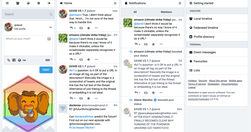
re-reading some articles about Mastodon from early 2017 identifies some common misconceptions:It Isn’t “True” Federation": Mastodon instances ... can block other sites or control who has access, they aren’t truly federating" - a "free speech absolutism" argument "complaining that you want to say things and you want to force other people to listen"…
Thoughts on adding activitypub to ghose ' relevant also to myhub."There is rss-to-activitypub 11 i... the only thing Ghost would be federating is the posts themselves ... if you want to federate comments too, then this only address half the issue... I would propose is something in the middle that: pulls in content from Ghost and pushes it as Activ…

Interesting piece on the reverse side of the network effect: the more people leave, the faster the remainder leave. So what will make people leave?Gen Z want privacy, hate bullying/speech, don’t like ads and think "Facebook is for moms and grandparents""Millennials Are Ready to Ditch... too old to bicker with strangers... [and] still remember thos…

"ActivityPub gives applications a shared protocol and syntax that they can use to communicate with each other... [but] writing software that implements federation logic and data structues has been technically challenging"Bonfire provides developers "a kit that manages the data and federation out of the box... enable end users to deploy a server an…
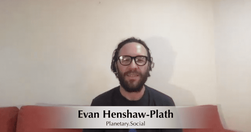
One of a great series of Reimagining the Internet podcasts. Guest: the Planetary.Social founder, discussing:the early days of Twitter: "Twitter's innovation ... happened all at the edges... users created everything... inline images and short links and retweets and the app, actual at and hashtags... the company... cultivated this garden where innov…
Content moderation "will always end up frustrating very large segments of the population and will always fail to accurately represent the "proper" level of moderation of anyone".any moderation will upset the moderated no moderation will upset those who don't like spam, harassment, etcpushing moderation to the users puts the burden on them*moderati…

Reach outside your own site with federation via ActivityPub. WriteFreely lets anyone on Mastodon, Pleroma, or any ActivityPub-enabled service follow your blog, bookmark your posts, and share them with their followers. See how it works.
After pointing out that mainstream - ie centralised - social platforms cannot moderate effectively due to scale, then introduces fediverse/activitypub-based platforms. Will they face same moderation problems as the mainstream if/when they grow?Takes Gab's unsuccessful move into fediverse as an example: "Almost immediately, Gab was met by a dedicat…

Given the myriad problems posed by social media platforms - content moderation, disinformation, censorship, privacy, anti-trust - this article "proposes an entirely different approach... that enables more free speech, while minimizing ... trolling, hateful speech, and large-scale disinformation efforts... also might help users ... regain control o…

"adversarial interoperability... create a new product or service that plugs into the existing ones without the permission of the companies that make them... once the driver of tech’s dynamic marketplace" now stifled by legal means by Big Tech, which "climbed the adversarial ladder and then pulled it up behind them".EFF sees restoring adversarial …
"corporate-run social media implies a structure [and]... content limits the users have no say in, which favor harmful [content] ... while inhibiting freedom of expression. ... the next platform has the same problems ... “I’ll just build my own platform” leads to ... “alt-tech” platforms ... to host right-wing extremist content... So what does “dec…

Didn't know: "Prominent conservative donor Rebekah Mercer is among the company’s financial backers"Interesting point: one of the main reasons many are on FB/Twitter is to troll other people - will it be harder to get people to come back to an app where everyone agrees with them?
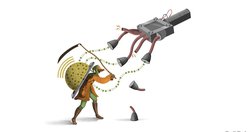
Overview of efforts to put data back into the hands of people. "platforms’ business models depend on network effects and scale to keep users engaged and to sell more advertising... a culture of virality that... poisons public discourse." Moreover, their data dominance is stifling competition & innovation. " So trustbusters are on the warpath... An…
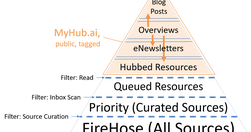
What did I learn about learning as I explored using Zettelkasten idea and knowledge management to write five newsletters about disinformation in the 2020 US elections?
What did I learn from Hubbing 50 resources and writing five editions on disinformation during the US elections?

Fleeting Note (FN): the creation of Fediverse-based alternatives might suddenly become an urgency.
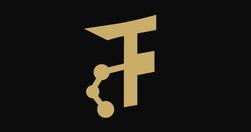
"Fediverse is an autonomous universe where power and data are decentralized and scattered across multiple lands, while mainstream corporate websites each made themselves an emperor of their huge land, surrounded it with high fences, and enforce all the decision-making, data control and censorship"

"Our digital public sphere has been failing ... [but] History offers a proven template for how to build healthier public spaces."Filter Bubble author Pariser hearkens back to Walt Whitman's creation of NY's Green Park, when "New York City had no public parks ...only walled commercial pleasure gardens for those who could afford". He saw American de…
Relevant Overviews
- Bluesky and the ATmosphere
- Content Strategy
- Fediverse
- Online Strategy
- Online Community Management
- Social Media Strategy
- Content Creation & Marketing
- Online Architecture
- Digital Transformation
- Thinking tools
- Zettelkasten
- Blockchain, Crypto, NFTs etc
- Personal Productivity
- Innovation Strategy
- Surveillance Capitalism, Social media and Polarisation (Overview)
- Disinformation in the US 2020 elections
- Communications Tactics
- Psychology
- Social Web
- Media
- Politics
- Communications Strategy
- Science&Technology
- Business